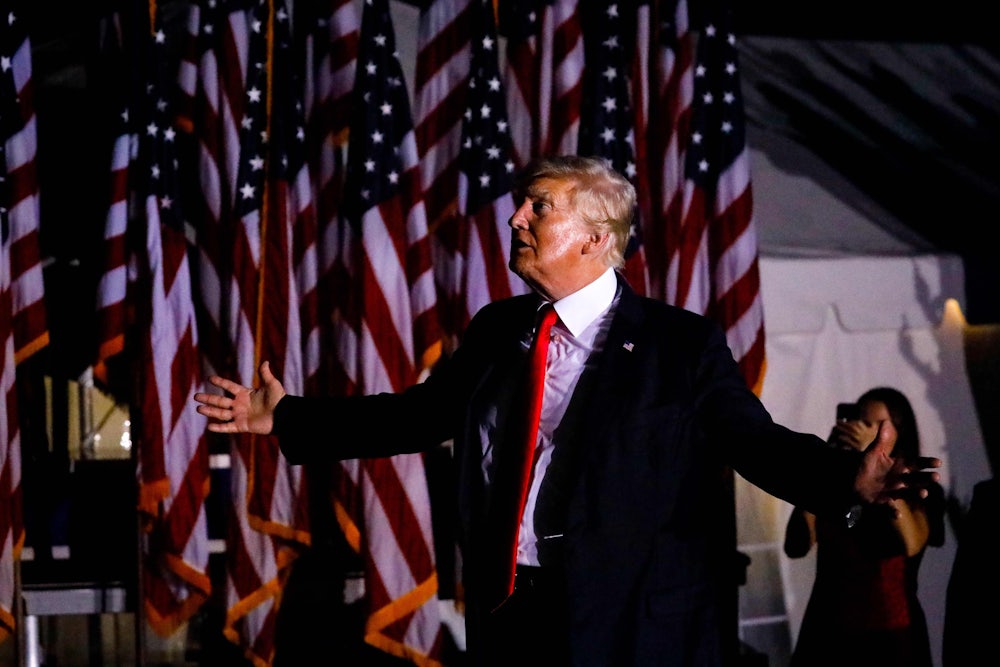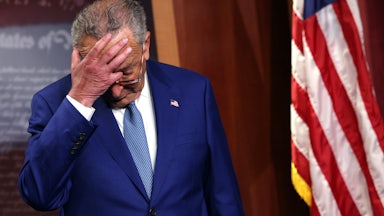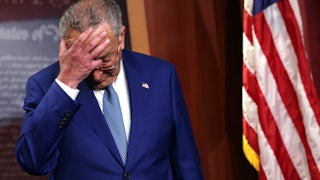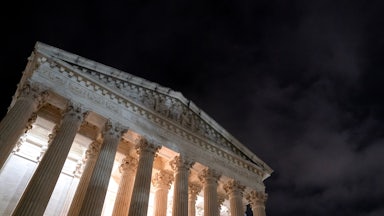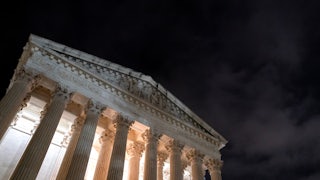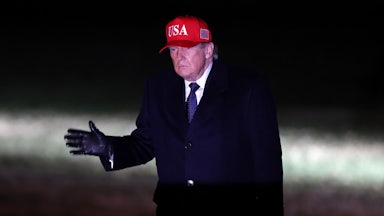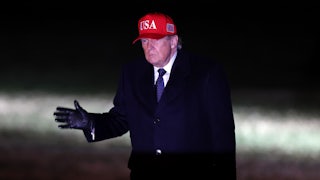It’s becoming a pattern: Investigators of the January 6 mob attack on the Capitol announce a new set of subpoenas, further expanding their probe, and then Donald Trump and his allies resist the investigation more, setting up a possible constitutional crisis, someday, over Congress’s oversight powers.
That outcome was potentially set in motion this week through Friday morning. Around the same time the House select committee charged with investigating the attack publicized its latest batch of subpoenas, news broke that the former president has been openly directing his former aides not to comply with the subpoenas.
But this episode offered a new twist. A separate congressional panel in the Senate released a nearly 400-page interim report with its own set of findings on Trump’s moves to sabotage the 2020 election. Titled, “How the Former President and His Allies Pressured DOJ to Overturn the 2020 Election,” the report is a result of a months-long investigation into Trump’s moves to pressure Justice Department officials to undermine the outcome of the 2020 election. That report introduced new people of interest, notably Representative Scott Perry, a retired army brigadier general and, naturally, a loyal Trumpist.
Perry, the report said, was one of the lawmakers who called Richard Donoghue, a top official at the Justice Department during the final days of the Trump administration, to tell him that improper ballot counting was “going on in Pennsylvania” (there was no credible evidence of this). The congressman, whose district includes the state capital of Harrisburg, was one of a number of lawmakers to whom Trump gave Donoghue’s phone number.
Perry urged Donoghue to direct Jeffrey Clark, another top Justice Department official, to focus more on how the department was handling the 2020 election. Perry, the report said, wanted Donoghue to direct another Justice Department official to get more involved in investigating the election because that official was “the kind of guy who could really get in there and do something about this.” Perry was the one, the report detailed, who brought Clark to a meeting in the Oval Office to talk about voter fraud. In other words, the Pennsylvania Republican was one of the main participants in Trump’s efforts to draw the Justice Department into his political agenda around interfering with the election outcome.
The moves by Perry were some of the biggest findings in the report—serious enough that Representative Bennie Thompson, the Democratic chair of the House select committee, signaled that they would factor in the committee’s findings with respect to the people involved in inciting the riot and recommendations in the report into its own investigations.
“This report has provided alarming details about the lengths to which the former President and his associates went trying to overturn the 2020 election,” Thompson said in a statement released shortly after the report came out. “This report will be an important resource as we work to develop the context in which the events of January 6th occurred.”
The Senate committee’s investigation and findings were from the party in the majority. Senate Republicans on the committee released their own 140-page report, which attempted to argue that “President Trump listened to his advisors” and that his “actions were consistent with his responsibilities as President to faithfully execute the law and oversee the Executive Branch.” The House committee has both Republicans and Democrats on it, although the only Republicans are apostates Liz Cheney and Adam Kinzinger, and the House Republican leader Kevin McCarthy resisted allowing that panel to be bipartisan.
The latter report is one of multiple moves Trump’s allies have taken, at this point, to avoid the committee as its work continues. Counter-reports aren’t enough. In the case of one Trump ally, Dan Scavino, a former White House deputy chief of staff, the January 6 committee hasn’t been able to find him to physically serve the subpoena. Scavino is part of the batch of subpoenaed Trump allies—alongside Mark Meadows, Kash Patel, and Stephen Bannon—whom Trump’s lawyer instructed (in writing!) to ignore the committee’s subpoenas.
Patel released a statement saying he would not comply with the subpoena. “I will continue to tell the American people the truth about January 6, and I am putting our country and freedoms first through my Fight with Kash initiative,” Patel said in a statement to The Washington Post, referring to his fund for a “top-notch legal team” to represent him. He’s already raised $250,000.
As of Friday morning, there was no sign that this group had met the Thursday subpoena deadline set by the committee last month.
Bannon also told the committee he would not comply with the subpoenas, CNN reported on Friday.
The committee report also said that Jeffrey Clark, who ran the Justice Department’s civil division during the Trump administration, has not accepted the Senate Judiciary Committee’s request to be interviewed.
The response to these moves suggests that the investigation will only expand and become more contentious. Senate Judiciary Committee Chair Dick Durbin has asked for the District of Columbia Bar to start a disciplinary investigation into Clark. Representative Jamie Raskin suggested contempt charges against the former Trump advisers. But Raskin, a Maryland Democrat, also told the Post that it was Thompson’s call in the end. Thompson has also threatened that refusing the subpoenas could result in “criminal referrals,” according to The New York Times.
The Senate panel’s report on Perry is important. Congressional panels rarely direct their investigative resources to fellow members of Congress. But Perry’s involvement in Trump’s push to pressure Justice Department officials to override the 2020 election results sets him and other lawmakers up to fall under direct scrutiny of the committee.
Perry, who represents a light-red congressional district, is nothing if not an outspoken Trump ally. On January 6, he objected to Pennsylvania counting its electoral votes. He’s complained that the rioters who stormed the Capitol were protesting peacefully and law enforcement has been treating them like “terrorists” at Guantánamo Bay. He’s also conceded he was unaware of the specifics of the rioters who had been imprisoned. He’s said the real insurrectionists are on the left in the Democratic Party. He has compared Democrats to Nazis. He has argued that Joint Chiefs of Staff General Mark Milley should resign in response to a report that said the general secretly reached out to Chinese officials, circumventing Trump. He has also said that the “poorly vetted” Afghan refugees coming into the United States would result in “little girls raped and killed in the streets.”
The House select committee has shown no sign of slowing or refraining from dishing out more subpoenas to people involved in the rally just before Trump supporters stormed the Capitol or Republicans who were near Trump during the mob attack. The latest set of subpoenas went out to organizers of the Stop the Steal rally.
The House committee has already interviewed Donoghue.
An ongoing question over the investigation is how far the select committee can go in forcing aides to a former president or the former president himself to give information. The Trump aides defying the subpoenas could, if convicted of contempt of Congress, face fines as high as $100,000 and a year in prison. It’s new ground, though. The oversight powers of Congress were established during the very first Congress, and there has never been a president (even Richard Nixon) who has told his allies to fight congressional subpoenas.
It’s unclear whether Trump’s discussions with his aides are protected under executive privilege, the vague legal shield that protects presidents from having to disclose conversations with aides. It’s also unclear whether the Biden administration will move in to extend executive privilege to Trump and his team related to the investigation. Doing so could threaten the strength of executive privilege for future situations, and the Biden team may be thinking that any change it makes here could be used by congressional Republicans against it someday.
What is clear, though, is that the investigation into January 6 is yielding patterns, including how the probe is being handled and how Trump and his allies are going to respond. Every time the targets of the probe resist, investigators just plow ahead, going further and uncovering more. If anything, Trump is showing that even in his postpresidential life, he can start a serious constitutional crisis.
